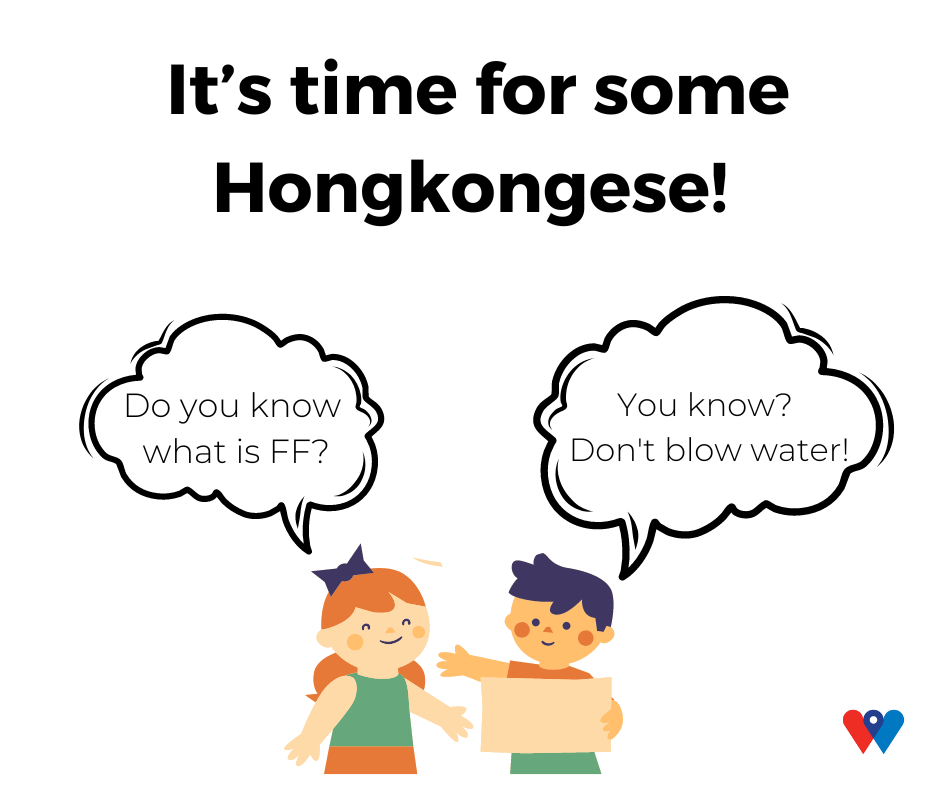It’s time for some Hongkongese
Joyce Chiang, Communications Manager of Welcoming Committee for Hong Kongers
Many people in Britain would know that Hong Kongers speak “Cantonese”, which is a different language from the Mandarin widely spoken in Taiwan and China. What they may not be aware of is that Cantonese speakers from different parts of the world may have their own versions of th language, especially in Hong Kong where it is highly influenced by English and other cultures. As a mixture of English and Cantonese developed over time, some unique words and phrases have evolved, with new terms emerging from time to time. These may not even be understood by Cantonese speakers from other parts of the world. So using “Hongkongese” is not just about Hong Kongers’ identity – it can also reflect differences in the language itself.
So today I would like to introduce you to some Hongkongese terms, used by many Hong Kongers – especially younger generations. Getting to grips with them may be easier than you imagine, as some are derived from English. And with others, even if you may not be able to remember the pronunciation in Hongkongese, just talking about their meaning can make your Hongkonger friends and neighbours feel very much at home!
Some Hongkonger netizens play with Confucius image to advise people not to over-imagine (FF)
FF - abbreviation from “Final Fantasy” - Hongkongers use to describe people full of fantasies and not very practical - like when your friend talks a lot about their “dreams” that they have no way to achieve, you may reply to them ‘“you FF too much”.
GG - abbreviation from “Good Game” - This is derived from the online game/e-sport world: when a player gets defeated, they would type or say this to the winner as a polite gesture. In Hong Kong, however, it has evolved to mean “screw up”, “dead” or “gameover”– usually talking about oneself but not limited to it. For example, “If i fail in this exam again, I’ll GG”; “If he cannot meet his sales target this month, he’ll GG this time.”
MM7 - It’s the code to input the Chinese word “正” (pronounced ‘jeng’), which means great. For example, “The new song from MIRROR is very MM7” (see my previous blog about MIRROR)
Siu4 [pronounced: ‘Siu Sei’] - “Siu” is the pronunciation of 笑, which means laugh. And 4 has the same pronunciation in Cantonese as “Die” [both pronounced “Sei”], so putting them together means “laugh die” (with a similar meaning as LMAO in English). For example “The Taskmaster last night was so good, Siu4.”
食花生 [pronounced: ‘Sik Fa Sun’] - the direct translation is “eat peanuts”, and it has a similar meaning as “bring your popcorn” in English, to describe a local drama that one should sit back and watch. For example, “The head of business development and the head of PR are fighting over the ownership of that project on the 5th floor!” “oh, let’s go eat peanuts! (食花生)
擺你上枱 [pronounced: Bai Nei Sheung Toi] - the direct translation is “put you on the table”, which has a similar meaning “put you on the spot” in English - but it not only talks about asking someone to share their views, but also kind of requires them to take some responsibility. For example, “My supervisor asked me to be the person in charge of the project in the meeting with the CEO. I couldn’t refuse at all, he put me on the table. (擺我上枱, Bai Ngor Sheung Toi)”.
吹水 [pronounced: Chui Shui] - the direct translation is “blow water”, and some Hong Kongers also use this directly translated into English as well. It carries two meanings. One is similar to bragging in English, for example: “Peter said he can eat 1000 pizzas in 10 minutes” “He’s just blowing water, I don’t believe it!”. The other meaning is more neutral, which means making smalltalk with others, for example. “I went to a reception last night, met some new people and blew water with them’.
Be Water - yes, it’s an English term, coming from a famous quote of Bruce Lee, “Be Water my friend” (and also cited recently on TV in Succession). It has been widely used by Hong Kongers since the social movement in 2019, also when facing changes in the social environment and the pandemic afterwards, Hongkongers would need to stay flexible when facing many “new normals” and restrictions. For those who left Hong Kong and moved to another country, they also need to stay flexible to settle in a new environment. So, “Be Water”, would resonate with many Hong Kongers who have moved to the UK.
These are some of the more popular Hongkongese terms, which we think may be easier to be understood by people in Britain. There are, of course, many more, and new ones keep emerging. There’s always more to learn – and the best way to do it, of course, is by chatting with Hong Kongers themselves.



